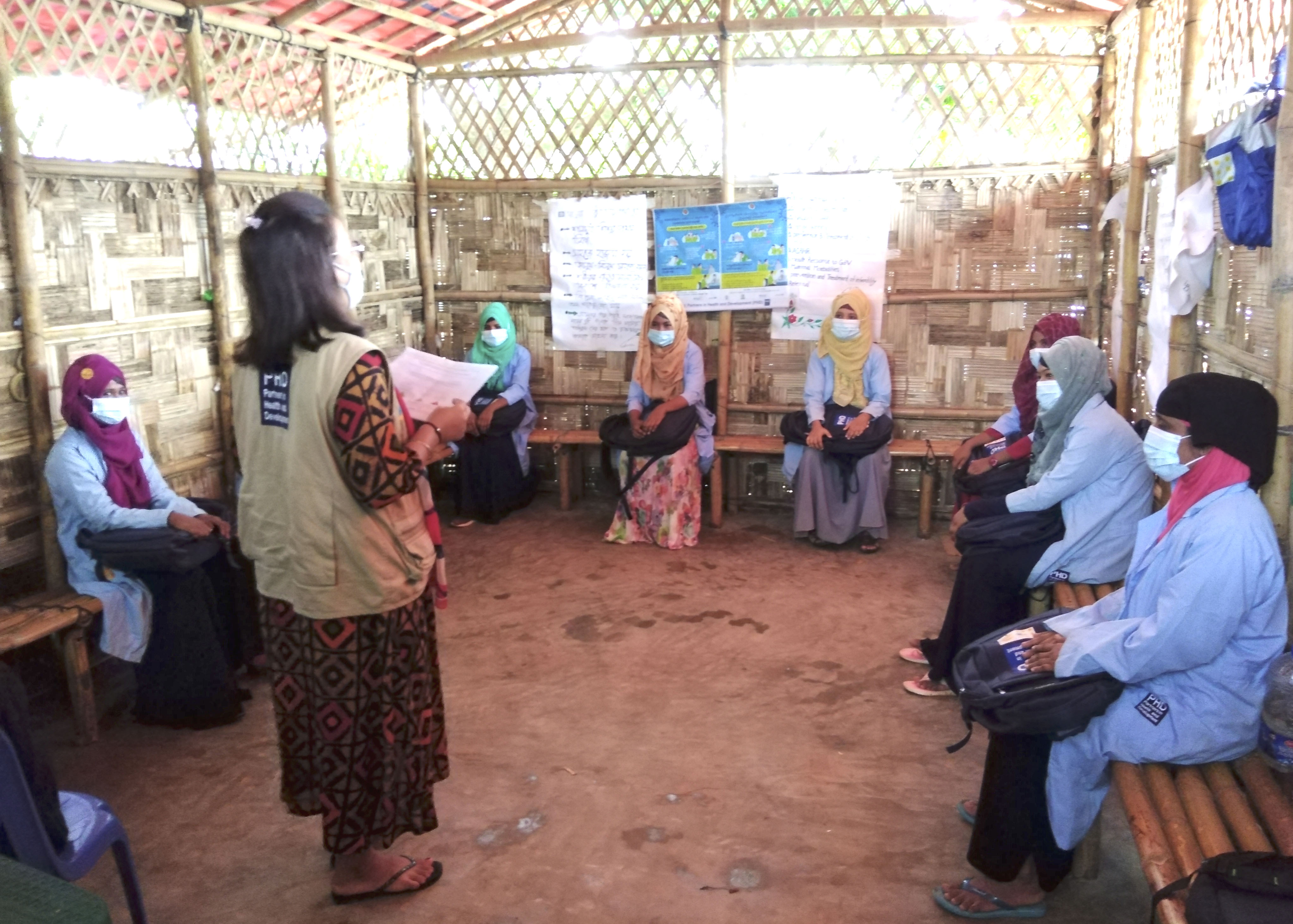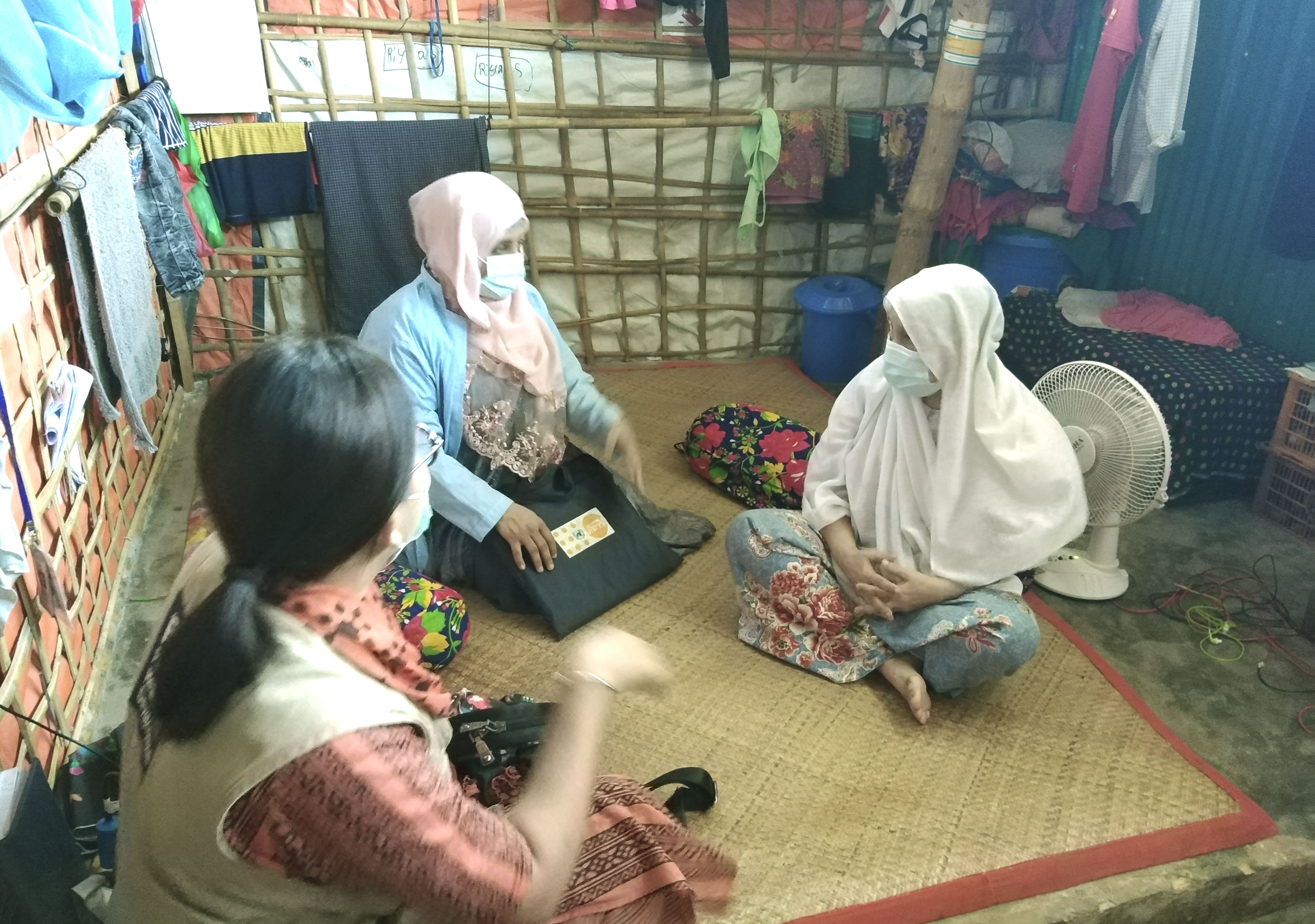|
Name of the project: “MaMoni Maternal and Newborn Care Strengthening Project (MNCSP) Supplementary Program Description for COVID-19 Response” Programme Area: Covid 19 Response Duration: November 2021 to September 2022 Funded by: USAID Managed by: Save the Children in Bangladesh Implementation area of PHD:
Phase-1: Faridpur, Munshiganj, Madaripur, Gopalganj, Laksmipur and Kushtia.
Phase-2: Maulavibazar, Netrokona, Naogaon, Sirajganj |
Since February 2021, MaMoni MNCSP COVID-19 Response Project has been implementing a community-based intervention, titled as Community Support Team (CST) intervention, for rural and urban municipality areas. This community model's primary aim is to create awareness, sensitize the relevant health authorities, local government, community and religious leaders, youth group etc.; detect suspects early, develop home-based care and community follow-up, connect them with testing facilities, and refer to the hospital when needed. Planned to implement in six districts in first phase with higher caseload, lack of availability of RT-PCR testing capacity, and presence of MaMoni MNCSP and rolled out in 10 districts in total. While the CST intervention has been rolling in, the project has contracted PHD to conduct some scheduled activities to strengthen the intervention in order to yield effective output from the intervention to influence the outcome of transmission reduction in the project area. Objective: Strengthen CST intervention with added activities Approaches: Engage with local government bodies in the district, upazila, and union of project area Engage with the community in the project area Program outputs are;
Results to achieve:
|
|
Name of the project: “Integrated response to COVID-19 crisis through healthcare, WASH and protection programs”
Programme Area: Health, Protection and Water, Sanitation and Hygiene (WASH)
Duration: July 2020 to March 2021
Funded by: USAID/OFDA
Managed by: Save the Children in Bangladesh
Other Partners; Gram Unnayon Sangathon (GRAUS) will work in Bandarban districts. Implementation area of PHD: 18 Unions of Chokoria Upqzila and 6 Unions of Teknaf Upazila of Cox;s Bazar District. Target audience: Approximately 291,029 people in Cox’s Bazar and Bandarban districts. |
Goal: The project goal is “To provide access to quality humanitarian assistance through integrated health, protection and WASH services to minimize the adverse impacts of COVID-19 in selected areas of Cox’s Bazar and Bandarban districts”. The project will have an integrated approach at the facility and community level. At the health facility level, project will strengthen the Upazila Health Complexes (UHCs) and Community Clinics (CCs) where WASH facilities (hand washing stations and rehabilitation of sanitation facilities and hygiene corners) will be integrated. At the community level, the project will address the problem of children's exposure to abuse, exploitation, and neglect in a holistic approach to child protection case management combining provision of specialized services and referrals. This will be strengthened through capacity building of staff, volunteers and government officials, and developing a strong cadre of community volunteers who will be trained as para social workers to support case workers to monitor low risk cases. Through the formation of MMUs, project will create provision of home-based care at community level for the COVID-19 of mild to moderate cases. Project's strategy involves close linkages between child protection (including PSS support), health, and WASH activities in order to ensure that affected populations have access to comprehensive services. Project will continue to provide training, field based supportive supervision and coaching to the SC’s staff, partner staff and volunteers to ensure quality of proposed services. All staff, volunteers and vendors will be trained on Child Safeguarding awareness, prevention, reporting and response activities. The project has 3 major sectorial objectives, likely Sector 1: Health; Sector Objective: To minimize community transmission of COVID-19 and strengthen health system response to reduce health risks and adverse health outcomes across 4 selected sub-districts Sector 2: Protection; Sector Objective: To promote protection mechanisms and facilitate access to specialized services for girls, boys and their caregivers with diverse needs and vulnerabilities to mitigate exposure to protection risks caused and exacerbated by COVID-19 Sector 3: Water Sanitation and Hygiene (WASH); Sector Objective: To ensure appropriate and acceptable sanitation facilities in the targeted UHCs complemented with hygiene promotion and distribution of hygiene items with strong focus on COVID-19, for affected or vulnerable communities of 4 sub-districts |
|
Community Based Maternal, Neonatal Sexual & Reproductive Health Program consistently responding to the Covid-19 emergency for the Rohingya and Host Community in Cox’s Bazar.
Donor - UNFPA Bangladesh with multi-donor support
|
|

 COVID-19 is not only claiming thousands of lives every day but also threatening other non-COVID health issues like maternity services including institutional delivery, contraceptives usage with each passing day. From the beginning of the COVID-19 pandemic, PHD, through its’ MNRHP project with UNFPA, has been relentlessly working for the people of Rohingya community and the host community (five unions), with more robust action against the COVID-19 along with maternity, neonatal care, STI, GBV and ASRH as pandemic response. Key interventions by PHD-MNRHP for eventual subsidence of the COVID-19 pandemic include:
COVID-19 is not only claiming thousands of lives every day but also threatening other non-COVID health issues like maternity services including institutional delivery, contraceptives usage with each passing day. From the beginning of the COVID-19 pandemic, PHD, through its’ MNRHP project with UNFPA, has been relentlessly working for the people of Rohingya community and the host community (five unions), with more robust action against the COVID-19 along with maternity, neonatal care, STI, GBV and ASRH as pandemic response. Key interventions by PHD-MNRHP for eventual subsidence of the COVID-19 pandemic include:
